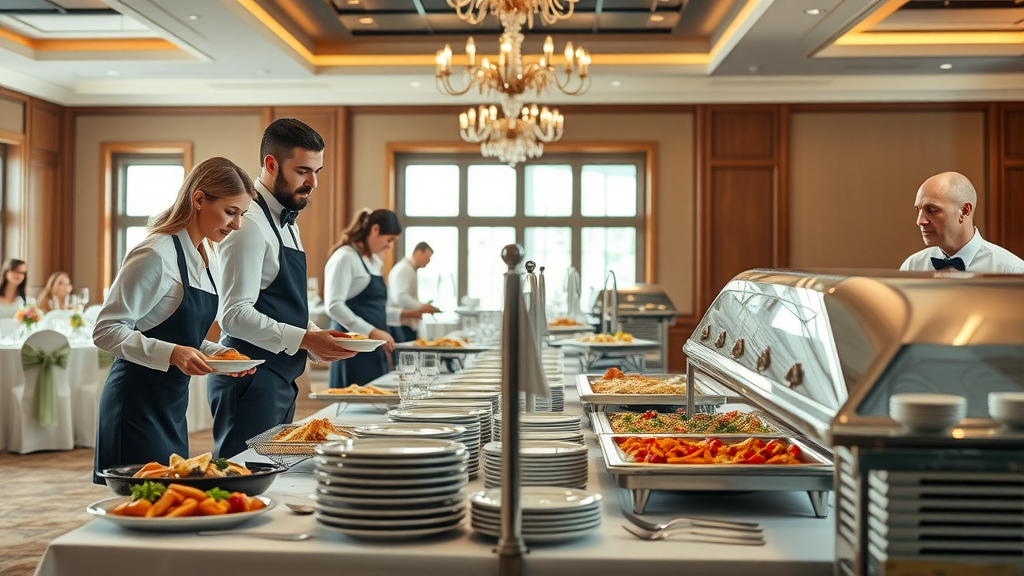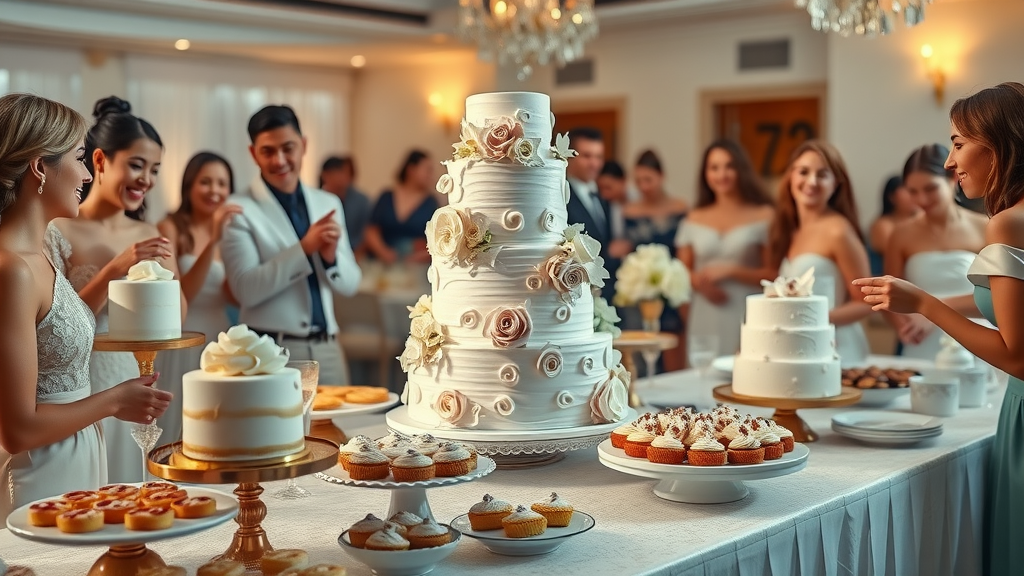Have you ever wondered if hiring a wedding caterer is really as straightforward as it seems? With your big day on the horizon, every detail matters—and food is often at the center of your celebration. Couples often fall into classic traps that cost more than just dollars; they lead to stress, disappointment, and avoidable headaches. In this guide, we’ll unravel the myths, pitfalls, and smart moves to make sure your wedding catering delights you and your guests, instead of becoming your biggest regret!

Is It Really That Simple to Hire a Wedding Caterer? Debunking Common Myths
At first glance, it seems like a breeze to hire a wedding caterer : you pick a company, choose a menu, and everything falls into place. However, wedding catering is complex—each detail, from service style to menu flexibility, impacts your entire wedding experience. Many couples underestimate the intricacies of hiring a wedding caterer , falsely believing all catering companies offer the same food and service . In reality, overlooking critical details like full service options, staff-to-guest ratios, or dietary restrictions can turn your dream wedding into a stressful ordeal. It's wise to approach with caution, research, and a clear sense of the experience you want your guests to have on your special day.
Practical examples abound: some couples choose based solely on price or word-of-mouth, only to discover later that their caterer can’t accommodate a complex seating chart or has hidden fees for overtime and cake-cutting. Others may forget to check for professional licenses, food allergies, or the flow of the meal. To truly succeed in finding a catering service that matches your event, focus on the full service options, ask strategic questions, and don’t shy away from discussing every tiny detail before signing a contract.
Why Overlooking the Details in Wedding Catering Leads to Major Stress
When planning your wedding day, it's all too easy to assume the caterer will cover every base. Still, attention to detail is critical. Do the servers understand your event’s timeline? Will there be enough service staff to keep drinks topped off and plates cleared? Missing these crucial details can mean delayed meals, frustrated guests, and a frazzled couple unable to enjoy their own celebration.
Not only does a lack of detailed planning cause on-the-day chaos, but it often results in costly last-minute changes or add-ons . The most frequent regrets reported by couples stem from trusting generic promises instead of pinning down specifics in advance. A simple oversight, such as not confirming the type of food or staff’s familiarity with family style service, can lead to awkward situations and missed expectations.
- Relying solely on reviews without strong references
- Not verifying staff ratios or qualifications
- Misunderstanding what’s included in “full service”
- Overlooking hidden costs like late setup or breakdown
- Assuming every guest’s dietary needs will be met without clear communication
Essential Insights Before You Hire a Wedding Caterer
The path to a stress-free wedding reception hinges on understanding wedding caterers and the breadth of services available. Catering isn’t a one-size-fits-all offering; you’ll encounter a variety of catering service styles, pricing models, and culinary options. Before you hire a wedding caterer , clarify your priorities, such as full service, menu flexibility, and special requests like vegetarian or allergy-friendly dishes. Conducting tastings, confirming logistics, and setting a transparent budget in advance can help you avoid headaches later.
Carefully evaluating whether you want a formal plated meal, a casual buffet line, or the interactive charm of family style service will shape everything from your floor plan to your guest experience. But before you get into aesthetics or trends, make sure you’re clear on the fundamental differences between full service and alternative catering styles.
Understanding Wedding Catering: Full Service Versus Limited Service
Not every wedding caterer provides the same level of food and service . Here’s the distinction: full service caterers handle everything—setup, tables, linens, china, staff, breakdown, and even rentals—while “drop-off” or limited service caterers simply deliver food, leaving the rest to you or your venue. The choice matters: with full service, you’re buying expert oversight and peace of mind; with limited service, expect to manage more logistics (or risk chaos).
Couples often discover too late that the savings from going limited are offset by extra costs for servers, setup, and overtime. Especially for larger events, or if you want a seamless flow, investing in a full service catering company pays dividends in reduced stress. If your venue requires staff for carving stations, cake cutting, or managing the bar, clarify who handles these tasks before signing on the dotted line.
| Feature | Full Service Caterer | Alternative Service Styles (Drop-off, Buffet-Only, Food Truck) |
|---|---|---|
| Setup & Cleanup | Handled entirely by catering staff | Client/venue responsible or minimal staff provided |
| Staffing | Service staff, bartenders, chefs, support included | Typically just delivery driver and/or one attendant |
| Rentals (china, flatware, linens) | Included or arranged by caterer | Client must source or pay extra fees |
| Coordination | Caterer manages all reception logistics | Clients handle details or hire additional help |
| Customization | Menu, timing, and style fully customizable | Limited flexibility; often set menus |

How Service Style Impacts Your Wedding Catering Experience
The service style you choose defines your guest interactions, timing, and atmosphere. Family style meals encourage sharing and lively conversation but require careful planning for seating chart and table logistics. A buffet line offers variety and flexibility but may slow down the dining process or disrupt the flow, especially for large events. Plated dinners signal formal elegance and keep things moving swiftly, while cocktail receptions maximize mingling but demand creative small-plate options.
Couples often pivot mid-planning, seduced by trending ideas like food trucks , without considering how that affects staffing, access to power/water, or dietary needs. The key to success? Match the service style with your venue, guest count, and personal priorities—then make sure your caterer can execute your vision seamlessly with a strong catering staff.
- Family Style: Festive, communal feel, higher coordination needs
- Buffet: Flexible, appeals to varied tastes, needs space/time management
- Plated: Formal, structured, more service staff required
- Cocktail Reception: Social, light fare, encourages movement
Questions You Must Ask Your Wedding Caterer Before Signing
Before you hire a wedding caterer , ask targeted questions that reveal more than the basic menu or price per plate. Strong communication and transparency are must-have qualities in any catering company . Here are the conversation starters that can save you from disaster:
- What’s included in your full service catering scope?
- How do you handle dietary restrictions or allergies?
- What is your backup plan for staff shortages or late arrivals?
- How is overtime calculated, and what are the costs for additional services?
- Can we taste the food before we sign a contract?
- Do you provide any equipment or rentals, and are there extra charges for setup/breakdown?
- Can you supply references from similar wedding sizes or styles?
Asking these critical questions increases transparency, helping you avoid common pitfalls and get a realistic sense of how your wedding day will be managed.
Wedding Catering Budget Blunders You Can Easily Avoid
Budgeting for your wedding catering isn’t just about the price per head—it’s about understanding the entire scope, from rentals to hidden service fees. Far too many couples fixate only on menu options and basic pricing, only to be blindsided by unexpected add-ons during the final bill review. Taking a proactive budgeting approach will ensure you’re not reeling from sticker shock after your special day .
The most common misstep? Failing to clarify what “all-inclusive” means for your caterer. Some packages sound comprehensive but don’t include critical elements like bartender service, staffing for busing, or even the cake-cutting ceremony. Dig deeper during your consultations, and always ask for a detailed proposal—line by line.
Common Pricing Mistakes When You Hire a Wedding Caterer
"A leading planner says, Budgeting for wedding catering is more than just meal cost—hidden fees and upgrades catch most couples off guard.
" Catering pricing is notoriously complex, especially as your vision evolves. Small upgrades—a specialty dessert, rented artful china, or a late-night snack station—can add hundreds or thousands to your bill. Remember, the proposal you sign is your best protection against surprises, so make sure every detail is documented.
Another trap couples fall into is assuming a per-guest cost is the only fee to expect. Service fees, overtime charges, travel fees (for remote venues), and even cake-cutting can be tacked on to the total invoice. A seasoned wedding caterer should walk you through the breakdown so nothing is left to chance.

Minimizing Unexpected Costs With Your Wedding Caterer
To keep your wedding catering budget in check, demand itemized invoices and confirm what’s included. Pay close attention to often-overlooked expenses: will you be charged extra if your celebration runs long? Are blending services (mixing specialty cocktails) covered, or do you need to hire an independent bartender? Ask about travel fees, rental upgrades, and whether cake-cutting services cost extra. By anticipating the most common “sneaky” expenses, you can negotiate or adjust before it’s too late.
- Staffing and overtime, especially for larger events or remote locations
- Fees for cake-cutting or serving desserts not provided by the caterer
- Additional travel and delivery charges for sites outside main service areas
- Last-minute upgrades to linens, glassware, or food stations
- Gratuity and service fees—often up to 20% of the total
The Role of Wedding Caterers in Food and Drink Decisions
Beyond simply providing wedding food , your caterer is your culinary and logistical partner. Choosing a seasoned wedding caterer means benefitting from deep expertise in menus, timing, and handling large or diverse groups. They can help you plan courses that fit the flow of your evening—whether you want cocktail hour followed by a formal meal, or grazing stations and food trucks for a modern twist. A collaborative process ensures that your culinary vision and practical needs are equally addressed.
Food and drink are the core of most wedding celebrations. How your caterer incorporates dietary restrictions, late-night snacks, and guest-friendly options will affect not just the taste, but the pace and energy of your reception. Look for a caterer who can flexibly suggest wine pairings, creative dessert tables, or custom signature drinks that reflect your personality as a couple.
Menu Tasting: A Non-Negotiable When You Hire a Wedding Caterer
Never, ever skip the food tasting . These sessions allow you to savor every course, provide feedback, and tweak recipes according to your palate or dietary needs. It’s also a chance to catch issues that wouldn’t be obvious on a menu—like portion size, spice level, or plating. Tasting gives both parties (couple and caterer) the chance to recalibrate expectations and avoid last-minute menu changes on the big day.

How Family Style and Service Styles Influence Wedding Day Flow
"An experienced wedding caterer shares, The flow of your reception hinges on the service style you select.
" Family style encourages guests to mingle and builds a festive energy, but it requires wider tables and more staff coordination. Buffets provide variety and work well for casual affairs yet often create buffet line congestion during peak times.
Plated service means elegance and rhythm, as guests receive meals together, but it’s more expensive due to increased staffing. Cocktail receptions turn the focus to the dance floor and conversation, requiring careful design of cocktail tables and regular rotation of hors d’oeuvres. Your chosen service style truly shapes everything from timeline to guest satisfaction.
Wedding Cake and Dessert Considerations in Your Catering Plan
The wedding cake has long been a centerpiece of the wedding day —but don’t overlook logistics. Some wedding caterers provide cakes and desserts in-house, while others require you to bring in a separate vendor. Cake-cutting may incur a fee, so clarify responsibilities before assuming it’s included.
Modern couples love adding donut walls, dessert bars, or gourmet treats as part of their catering experience. The best wedding caterers seamlessly coordinate with outside dessert vendors (if allowed by your venue), manage setup, serving, and ensure every sweet treat is elegantly presented. If desserts are a highlight for you, discuss options and fees early on so nothing is left to chance.

Red Flags to Watch For When You Hire a Wedding Caterer
Not all wedding caterers are created equal. Some promise the moon but fall short when it comes to execution, communication, or flexibility. If your caterer dodges basic questions, provides vague answers, or balks at custom menu requests, beware. Other red flags include a poorly maintained website, lack of health permits, or unprofessional behavior during tastings or tours.
- Lack of transparency in pricing or policies
- Poor or slow communication throughout planning
- Inflexible menus or refusal to accommodate dietary restrictions
Watch out for contracts with lots of fine print, as well as vendors who won’t supply references or are unwilling to let you taste the food before booking. When in doubt, trust your instincts—high-pressure sales tactics or dismissive attitudes are signals to keep looking.
Why Reputation Matters: Checking Reviews and References
Reputation speaks volumes in the wedding catering industry. A top-rated wedding caterer thrives on strong testimonials, referrals from venues, and glowing online reviews. Make it a point to reach out to past couples and venues for unfiltered feedback, and don’t be afraid to ask detailed questions about how unexpected issues were handled. Solid references give you peace of mind and a preview of what to expect on your special day .
Also consider how long the caterer has been in business. Years of experience mean they’re prepared for surprises, can handle last-minute guest count changes, and have trusted relationships with rental companies or venues. Trustworthy wedding caterers will always go the extra mile to ensure your experience is memorable for all the right reasons.
People Also Ask: How much is a caterer for a wedding?
Understanding Wedding Catering Pricing Structures
Couples most frequently ask: How much is a caterer for a wedding? Costs vary widely based on catering service type, region, and guest count. Most wedding caterers charge a per-person price, typically ranging from $40 to $200 or more. Full service, including rentals and staffing, is at the upper end; drop-off or food truck approaches cost less but offer minimal logistical support. Always factor in taxes, gratuity, upgrades, and overtime before finalizing your contract.
The best way to get an accurate quote is to provide your potential catering company with detailed information: guest count, timeline, menu preferences, and special requests. Ask for a breakdown of costs—don’t just accept a lump sum. This transparency helps you compare apples to apples and ensures that your wedding day doesn’t include financial surprises.
People Also Ask: What is the cheapest way to cater a wedding?
Low-Cost Alternatives to Traditional Wedding Catering
If budget is a top concern, creative couples are finding new ways to serve great food at lower costs. Buffet line or family style service typically costs less than plated options due to reduced staffing and rental needs. Consider working with local food trucks , hosting a casual picnic, or enlisting a talented friend or community group for home-style cuisine. Just make sure the logistics (permits, food safety, setup) are in place and that your vendors can handle the scope of your guest count.

Other budget-cutting tips: Opt for a shorter cocktail-style reception, stick to seasonal and locally sourced foods, or arrange a dessert-only event followed by a late-night snack hour. Be realistic about the limitations of low-cost options, especially when it comes to expectations around service staff , presentation, and guest comfort.
People Also Ask: How much will it cost to feed 100 people at a wedding?
Real-World Wedding Caterer Cost Estimates for 100 Guests
Feeding 100 people at your wedding can range from $4,000 on the low end to well over $15,000, depending on venue, service style , food choices, and overall experience. Simpler menus with buffet or family style service cost less, while plated, multi-course meals with high-end ingredients and full rentals quickly escalate in price. Be sure to clarify if your quote covers all essential elements: appetizers, beverages, staff, rentals, tax, and gratuity.
Real-world estimates:
- Budget or drop-off service: $40–$70/person = $4,000–$7,000 total
- Full service plated meal: $75–$150/person = $7,500–$15,000+
- Food trucks or picnic style: $45–$85/person = $4,500–$8,500
The Smartest Moves When You Hire a Wedding Caterer
- Book your caterer early—top choices fill up quickly, especially in peak seasons
- Clarify service style and expectations up front
- Ask for every detail in writing (menus, staff ratios, timing, fees)
- Read every contract thoroughly before committing or paying deposits
- Don’t skip tastings and checks on references—these small steps yield big peace of mind
With preparation and clear communication, hiring the right wedding caterer will make your day delicious, seamless, and memorable.
Ready to Hire a Wedding Caterer? Take the Next Step
Contact Our Wedding Catering Experts
If you want to avoid wedding catering disasters and make confident choices, don’t go it alone. Take control of your wedding catering journey—Email us at info@norcalweddingvenues.com for expert advice.
Our experienced team is ready to answer questions, recommend local favorites, and help you secure the perfect fit for your special day .
Frequently Asked Questions on How to Hire a Wedding Caterer
-
Do I need a contract for my wedding caterer?
Absolutely—always have a signed contract detailing menus, pricing, staffing, and timing. This protects you against last-minute surprises. -
Is food tasting included when I hire a wedding caterer?
Most reputable caterers offer menu tastings prior to signing or after booking. Don’t skip this crucial step; it guarantees your satisfaction. -
How do wedding caterers handle dietary restrictions?
Discuss guest needs in advance. The best caterers provide vegetarian, vegan, gluten-free, and allergen-free options as needed. -
What payment schedule do wedding caterers require?
Expect to pay a deposit upon booking (often 25–50%), with the remainder due before the big day or shortly after. Confirm all payment terms in writing.
What You'll Gain: Avoiding Wedding Catering Disasters
- Spotting and sidestepping common budget traps and surprise fees
- Choosing the best service style for your vision and venue
- Making guest-friendly decisions to ensure your big day is memorable for all the right reasons
Key Takeaways on How to Hire a Wedding Caterer With Confidence
- Research, compare, and interview multiple wedding caterers to find your perfect fit.
- Insist on detailed contracts and never skip menu tastings.
- Clarify service style , fees, and all logistics up front.
- Account for hidden costs—staffing, overtime, and equipment rentals.
- Book early, communicate often, and prioritize reputation, flexibility, and professionalism.
Conclusion: Act early, ask the right questions, and get every detail in writing to ensure your wedding catering experience is as flawless and delicious as you've always dreamed.
 Add Row
Add Row  Add
Add 




Write A Comment